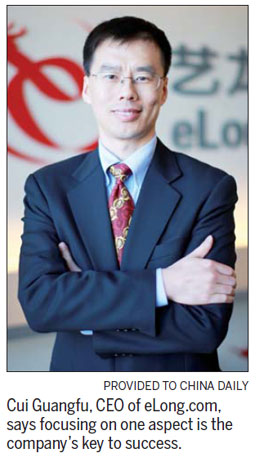A slimmer, more successful eLong
Updated: 2012-04-13 08:49
By Yan Yiqi (China Daily European Edition)
|
|||||||||||
|
|
Agency thriving by paring down on the number of services offered
In the ubiquitous one-stop shop model of online travel agencies, one major website has proven that it can succeed by paring down.
Online travel agencies in China have grown by leaps and bounds in recent years, with the value of the market reaching 167.2 billion yuan ($26.4 billion, 20.2 billion euros) last year, a growth of 61.3 percent from 2010, according to Shanghai-based iResearch Consulting Group.
Most offer a wide array of services for customers, from booking flights, arranging vacation or business travel packages, renting cars to securing hotel rooms.
ELong.com, the Chinese division of US online travel giant Expedia.com, has succeeded in doing less. Since Cui Guangfu, CEO of eLong, came aboard in 2007, the company stopped offering a palette of services to focus on one aspect that it believes can bring in a higher stream of revenue: hotel bookings.
"Who says one cannot trump four? The more focused we are, the more professional we will be. We do not want to be the second Ctrip, but the first eLong," he says.
The Nasdaq-listed company ranks second in the Chinese online travel market with a 6.8-percent market share (based on sales revenue) behind Ctrip.com, China's largest online travel service provider and at 41.1 percent market share, according to iResearch. Mangocity.com, which puts more value on booking flights, ranks third.
As soon as Cui took over five years ago, he cut vacation and business travel packages from the company business model and targeted hotel bookings.
"With limited resources, we need to put all the energy and money on the right place," Cui says.
ELong was in the red for some years prior to his arrival. It has now posted profits of 19.9 million yuan in 2009, 20.9 million yuan in 2010 and 39.7 million yuan last year. It made 481.9 million yuan in sales revenue in 2010; and 625 million yuan last year.
Cui's reasoning for the new focus was simple: five years ago, booking hotels was highly profitable.
"That was the peak time for the hotel booking market, with gross profit as high as 70 percent. The hotel booking business also grows the fastest in the (online travel agency) industry," Cui says.
According to iResearch, the business of securing hotel rooms is the most stable among the array of services in the online travel service market. Revenue for booking flights will drop from 43.2 percent in 2008 to 34.1 percent in 2015. Booking hotels, however, will remain robust at a 43-percent growth target over the next five years.
Nepotism is another reason why eLong is banking on hotel bookings. Its relationship with Expedia, its parent company, gives eLong a major advantage over its competitors because of Expedia's overseas hotel resources.
"We have connected with Expedia hotel inventory, so that we can sell about 150,000 overseas hotels," Cui says. "Expedia shares its best practices in online hotel bookings with the eLong team. We will then apply the learning and make sure consumers have the best booking experience with eLong," he says.
Ctrip, by comparison, has a hotel network of 30,000, domestic and overseas.
Before he became the CEO of eLong, Cui was the general manager of FedEx Kinko's China division for four years and had spent 12 years at Procter & Gamble.
He says one way in which eLong is working to make the hotel booking experience a positive one is by providing better customer service for Chinese consumers.
"Today, when our clients want to book a hotel room outside China, they have to go through the Expedia website payment process, in English. What we are doing is to transfer the process under our own website with a Chinese service," he says.
Cui says eLong has a network of more than 27,000 domestic and 150,000 overseas hotels.
In 2011, revenue from hotel reservations contributed 71.8 percent of the company's total revenue, according to its annual financial report.
Although the figures pale in comparison to Ctrip's 3.5 billion yuan in annual revenue last year (1.5 billion yuan of which came from hotel reservations), Cui believes growth is what really counts in the market.
Last year, sales revenue from hotel bookings alone reached 448 million yuan, a growth of 29.3 percent from the previous year. Ctrip's hotel booking revenue rose only 16 percent.
"In the fourth quarter of 2011, numbers of hotel rooms sold via eLong increased 50 percent year-on-year, but the figure was 15 percent for Ctrip. It was the seventh consecutive quarter for eLong to beat Ctrip in terms of growth rate," he says.
He says eLong's success in online hotel booking market should be attributed to its efforts in establishing low prices through group-buying.
On eLong's official website, there are more than 2,000 hotel group-buying products, covering both domestic and overseas tourist attractions, mostly with a discount of more than 50 percent.
Deng Zhangyu contributed to this story.
yanyiqi@chinadaily.com.cn
Today's Top News
Rescuers race against time for quake victims
Telecom workers restore links
Coal mine blast kills 18 in Jilin
Intl scholarship puts China on the map
More bird flu patients discharged
Gold loses sheen, but still a safe bet
US 'turns blind eye to human rights'
Telecom workers restore links
Hot Topics
Lunar probe , China growth forecasts, Emission rules get tougher, China seen through 'colored lens', International board,
Editor's Picks

|

|

|

|

|

|






